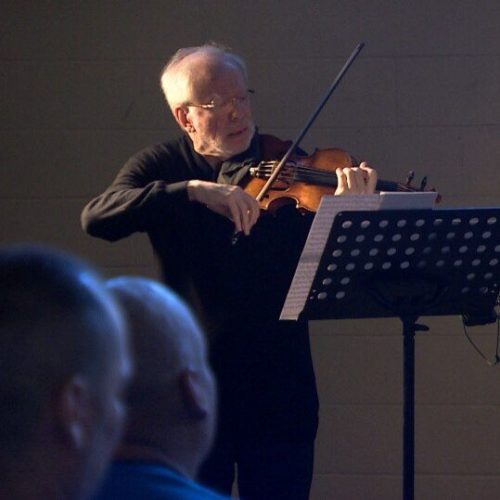

Toccata have an album coming out of music by Herman Galynin:
Galynin (1922–66) was one of the brightest hopes of Russian music, admired by his teachers Shostakovich and Myaskovsky. His early, student compositions brought him swift fame, but a mental collapse confined him to an asylum. Even if the extraordinarily high voltage of his early music isn’t quite maintained in his later works, they still show both fire and finesse. Seen as a whole, the wild, freewheeling energy of his compositions – as witness these five works for strings – leave little doubt that he could have been one of the major musical voices of the second half of the twentieth century; as it is, what he did achieve is remarkable. Yuri Abdokov’s extensive booklet notes are informed by the memories of his own teachers, Boris Tchaikovsky and Nikolai Peyko, who were friends of Galynin’s from boyhood, after he had been rescued from his early life as an orphaned street urchin. Abdokov quotes Rudolf Barshai’s memoirs: ‘Once in the cold, without putting on a coat and hat, he went to Gorky Street, entered the Central Telegraph building, looked around and shouted loudly: “Stalin and Zhdanov are murderers!” He was seized, of course, and then put into a madhouse’. Abdokov mentions another such occasion, at a Party meeting, where the chairman had vilified Shostakovich. Galynin’s response was to defend his teacher – but not with words: he grabbed a chair and rushed at the chairman, before being forcibly restrained. His music is characterised by the same impulsiveness…
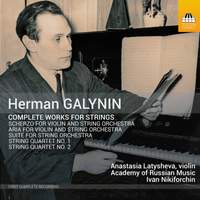
Dozens of musicians are sharing memories of a great soloist, concertmaster, teacher and human being, who died this weekend at 95. Here are a few.
Composer Christopher Gunning: The incredible violinist, Erich Gruenberg, has died. He played the violin solos on my first ever BBC film, Rogue Male. It was crucial to the score that the violin solos were played in a particular style – ‘British’ but expressively so – and the minute Erich started, I realised we had the perfect musician for the job. We spent the day holding back tears each time he played! Sometimes there were violin duets and then he was joined by Kenneth Sillito, also superb. The recording was engineered by Keith Grant, genius of Olympic Studios, and the sessions were conducted by Marcus Dods. It was one of the very best days of my life; I was in my mid twenties and went on to work on more productions with Clive Donner, who, like everyone I’ve already mentioned is no longer with us, except Ken Sillito. How fortunate I’ve been to work with such wonderful people.
Violinist Antonia Azoitei: I was so, so lucky. I owe him an enormous amount. When I arrived from RNCM I had a fairly solid technique but was totally lacking in confidence and strength of mind. He transformed me into a confident communicator and by the time I left I had won awards and got the highest mark of all the string players that year in my final recital. He also had such a knack of knowing what repertoire matched me. He taught me more about mindset and work ethic I think than anything else but that was exactly what I needed at the time. He gave me the tools to have the freedom to express myself and a rock solid voice of my own.….
I have so many funny stories about him I couldn’t put them all here. All his students loved him and with good reason. He was a man of few-ish words but everything he did say spoke volumes. I loved his stories he would pepper my lessons with, about his days leading the LSO, leading the session orchestra for the Beatles albums at Abbey Road (pissing Paul McCartney off by insisting the orchestra left on time, 5 minutes after a day of faffing around rewriting when he finally got down to asking them to play something!) 🤣 I learned a lot about the orchestral world from him.
I loved his stoicism, when I came in broken hearted to a lesson after a bad break-up trying to explain that I just couldn’t play, his warm but firm response was so strangely comforting and created my “the show must go on” attitude I have stood by ever since.
I secretly loved it that he always gave me the first violin lesson of the day at 08:00 though I moaned about it. Once when he was doing the schedule, trying to decide who to give that slot to, I said “Erich, you do know I live in Greenwich and I have to get up at 05:30 to come in for 07:30 to warm up for that time?” He chuckled and wrote my name down next to it anyway. He knew as well as I did I liked the extra push to be productive. I used to play a game with myself where I would try to beat him into the Academy to be practising before he arrived, 07:30, 07:15, 07:00… I never once managed it. He was always there, playing away already!
And the way he would catch me out when he knew I hadn’t practised! Calling my bluff by making me sightread the whole of the Sibelius concerto from beginning to end despite my protestations I hadn’t had time to learn it. (I never brought an unprepared concerto to him again 😆).
I chose him as a teacher because I had heard he was tough, and that was exactly what I wanted – he could indeed be uncompromising but what I wasn’t expecting was his warmth, his humour and the constant twinkle in the eye. Needless to say, I chose well.
I think the best illustration of his character as a teacher comes from the last thing he ever said to me, at my graduation. After graduating with distinction in my PGDip, being awarded the DipRAM and winning the Beare Prize for an outstanding final recital (I think I got the highest string mark?) he said to me, “Hmmm, well… you could have learned more. But you did well I suppose.” 🤣🤣🤣 I agreed with him.
The RPO: The Royal Philharmonic Orchestra was deeply saddened to learn of the death this past weekend of the remarkable violinist Erich Gruenberg, who held the leader position at the RPO from 1972 – 1975 giving concerts under the baton of the RPO’s then Artistic Director Rudolph Kempe alongside many other prolific conductors. Erich Gruenberg was born in Vienna in 1924, moving to London in 1946 after a period in Jerusalem leading the Palestine Broadcasting Corporation Orchestra. During his long career he was leader of the Stockholm Philharmonic Orchestra, the London Symphony Orchestra and the Royal Philharmonic Orchestra, and was first violin with the London String Quartet as well as a professor at the Royal Academy of Music in London.
Laura Rickard: I was so very very lucky to study with Erich, such special lessons both at RAM and during the summers in Vienna, him laughing as he effortlessly demonstrated virtuosic passages well into his 90s. The youngest nonagenerian there will ever be. Always direct, full of wit and so generous with his time.
I am, and always be will so incredibly grateful for this wonderful man’s generosity, great humour, insatiable appetite for music and all round genius. We’ve lost one of the world’s great violinists, most famously as leader of the RPO but also as a soloist and teacher. If you don’t know his playing please do listen, Beethoven Concerto with Horenstein, many of the Beatles tracks, silky Scherazade solos with Stokowski and the LSO, a wonderful Messiaen Quartet for the End of Time and some gorgeous Kreisler miniatures stand out but his discography is endless
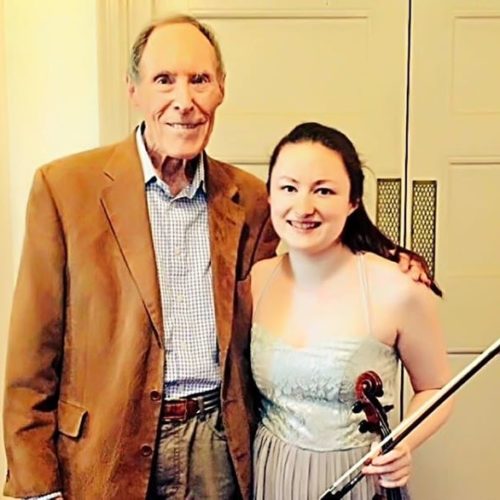
Galina Tanney: I first met him very soon after my mother died suddenly, but I knew that not moving to London to study with him would be a missed opportunity and that I just had to go for it.I’m so thankful I had the chance and I learnt so much repertoire with him,sonatas and concerti which could have been overwhelming in so little time,but he illuminated it all effortlessly.
Akkrawat Paye Srinarong: Erich Gruenberg & John Georgiadis.
Bangkok Symphony 1994
Dad was concertmaster, I was right behind him. The journey began here.
The day after this, I went knocking on his hotel room at Rajadamri, played Sibelius Concerto horribly, and he probably pitied me enough to find ways to have me as student even when I was still finishing middle school. Recommending me to Purcell so that I could do A Levels. Then RAM. Thank you Mr Gruenberg.
David Herman has written a shrewd piece in The Critic magazine on the decline and fall of the professional theatre critic.
Almost every point he makes can be applied to music criticism, a profession lacking in renewal and flair.
Sample:
It is hard to think of a leading critic under fifty. There is no new generation in sight. This is unprecedented. Billington was barely thirty when he began at The Guardian, older than Nightingale when he started at The Statesman. Much is made of the fact that Tynan took over at The Observer when he was 27, but Hobson was only 31 when he began as a theatre critic and James Agate was 30 when he began at The Guardian. Beerbohm was younger still, 26, when he began at The Saturday Review in 1898, and Shaw, his predecessor, was not yet forty when he became a theatre critic. Going further back still, Hazlitt was in his thirties when he first saw Kean’s debut as Shylock in 1814. The great critics, in short, always began before they were forty. Who are their equivalents today? Where are the new, young voices in theatre criticism?
Read on here.

The Haifa Symphony Orchestra is in mourning for Motti Eines, a charming and effective administrator who has died of a progressive illness at 65.
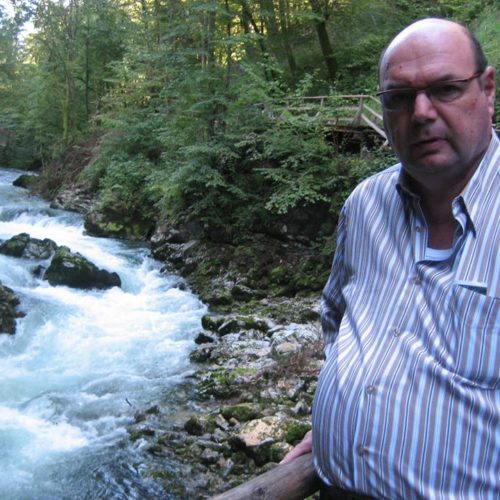
He had led the orchestra with great success for 12 years.
The French double-bass virtuoso Jean-Marc Rollez , considered the father of the modern French school, has died at 89.
He taught at the Paris Conservatoire and was principal of the Paris Opera Orchestra.
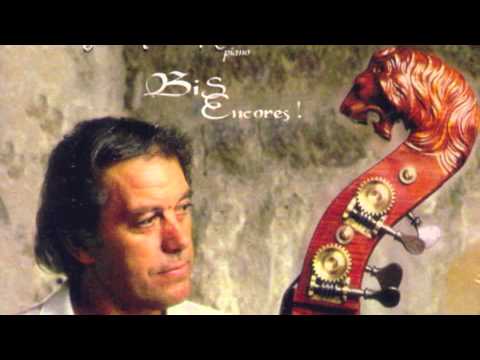
Veronique Sauger writes:
D’abord son nom, Jean-Marc Rollez. Son métier ? Contrebassiste soliste de l’orchestre de l’Opéra de Paris, et mon professeur au Conservatoire National Supérieur de Musique de Paris. Ensuite, son énergie, une énergie spéciale, un chant comme une déclaration de vie. Jean-Marc Rollez était cet homme qui voulut faire chanter la contrebasse et qui avança, tout droit, identique à lui-même, suivant sa route à l’intérieur…
Lithuanian National Opera and Ballet Theatre has shut down for the rest of August after its director called in sick with Covid-19 and more cases were reported around the country.
The director, Jonas Sakalauskas, admitted it had proved impossible for dancers to rehearse at distance or in masks.
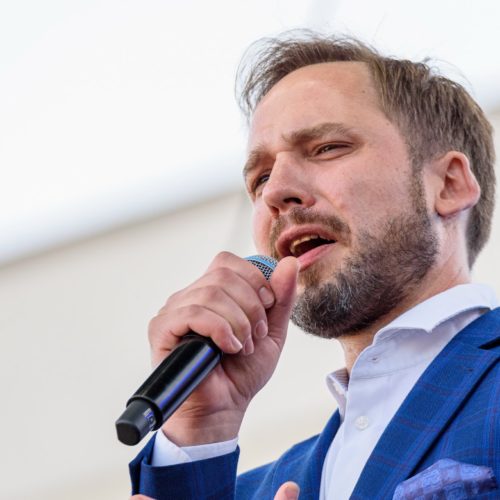
We have been informed that Erich Gruenberg died yesterday at his home in Hampstead Garden Suburb, aged 95.
A Hitler refugee from Vienna, he studied at the Jerusalem conservatory and won the 1947 Carl Flesch competition in London, where he settled.
He was successively leader (concertmaster) of the Stockholm Philharmonic, London Symphony Orchestra and Royal Philharmonic Orchestra, but he was also a renowned soloist who made many recordings, including the ten Beethoven sonatas (with David Wilde) and quite a few contemporary composers, incuding the premiere of the Berthold Goldschmidt violin concerto. He was also a wonderful teacher at the Royal Academy of Music.
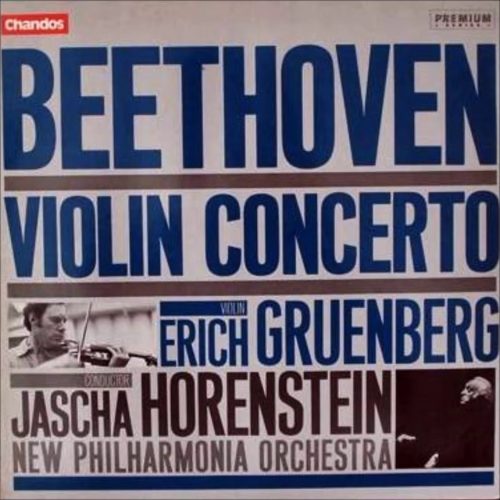
He is survived by his wife, Korshed Madan, and by two daughters, the pianist Joanna and violinist Tina, a member of the London Philharmonic. His passing marks the end of a momentous era for British music.
.